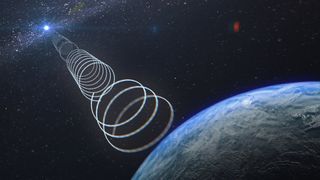

Mysterious 'cosmic burpers' are shooting out bizarre radio waves from galaxy's c...
source link: https://www.techradar.com/news/mysterious-cosmic-burpers-are-shooting-out-bizarre-radio-waves-from-galaxys-core
Go to the source link to view the article. You can view the picture content, updated content and better typesetting reading experience. If the link is broken, please click the button below to view the snapshot at that time.

Mysterious 'cosmic burpers' are shooting out bizarre radio waves from galaxy's core

(Image credit: Sebastian Zentilomo/University of Sydney)
Astronomers studying the central region of the Milky Way have discovered a new source of cosmic radio waves so bizarre that they are struggling to imagine what kind of object could be sending them out.
The radio waves vary in intensity, oscillate in only one direction, rotate over time, and randomly switch on and off with no discernable pattern, according to University of Sydney researchers, who published their data in a new study in the Astrophysical Journal.
"We've never seen anything like it," Ziteng Wang, a Ph.D. student at the University of Sydney and lead author of the paper, said in a statement.
"At first we thought it could be a pulsar—a very dense type of spinning dead star—or else a type of star that emits huge solar flares. But the signals from this new source don't match what we expect from these types of celestial objects," Wang added.
- video playing

- Galaxy S21 | Everything you need to know26/01/21

- Galaxy S21 Ultra | Everything you need to...26/01/21

- IPhone 12 Pro | Everything you need to know in 1...24/12/20

- AirPods Max | Everything you need to know in 1...24/12/20

- PS5 | Everything you need to know in 1 minute14/12/20

Since the radio waves do not match any known pattern or source, they could represent signals from a completely unknown class of object, but what that object might be is hard to imagine given the bizarre nature of the signals themselves.
“Looking towards the center of the Galaxy, we found ASKAP J173608.2-321635, named after its coordinates," said Wang's Ph.D. supervisor, University of Sydney professor Tara Murphy. "This object was unique in that it started out invisible, became bright, faded away and then reappeared. This behavior was extraordinary.”
The bizarre nature of this new find doesn't mean it is entirely unique, however. In recent years, astronomers have been finding that the universe is filled with radio waves that we are also just now being able to detect.
"The information we do have [about the object] has some parallels with another emerging class of mysterious objects known as Galactic Centre Radio Transients, including one dubbed the ‘cosmic burper’,” said Wang's co-supervisor David Kaplan, a professor at the University of Wisconsin-Milwaukee.
"While our new object, ASKAP J173608.2-321635, does share some properties with GCRTs there are also differences," he added. "And we don’t really understand those sources, anyway, so this adds to the mystery."
Analysis: radio astronomy opens up new frontiers we didn't even know were there
Radio astronomy is a quickly growing specialization thanks to new radio telescopes that can detect a broader range of radio signals, making stars and other objects in the universe that might be effectively invisible to us in the visible light discernable when viewed in the infrared or ultraviolet spectrums.
In recent years, all kinds of astronomical phenomena like supernovae and exotic objects like black holes have been imaged using radio astronomy, including the 2019 image of the supermassive black hole M87 at the center of the galaxy, the first ever image of its kind.
With new telescopes coming online in the coming years, like the James Webb Telescope we expect to replace the Hubble Telescope when it launches toward the end of 2021, even more of the universe will be accessible in ways we are only just beginning to realize.
“Within the next decade, the transcontinental Square Kilometre Array radio telescope will come online," Professor Murphy said. "It will be able to make sensitive maps of the sky every day. We expect the power of this telescope will help us solve mysteries such as this latest discovery, but it will also open vast new swathes of the cosmos to exploration in the radio spectrum.”

Computing Staff Writer
John (He / Him / His) is TechRadar's Computing Staff Writer and is also a programmer, gamer, activist, and Brooklyn College alum currently living in Brooklyn, NY. Named by the CTA as a CES 2020 Media Trailblazer for his science and technology reporting, John specializes in all areas of computer science, including industry news, hardware reviews, PC gaming, as well as general science writing and the social impact of the tech industry.
You can find him online on Twitter at @thisdotjohn
Currently playing: Valheim, Darkest Dungeon, Satisfactory
Recommend
-
 9
9
Dot Dash...
-
 3
3
Voyager 1 is 14 billion miles away and picking up a bizarre cosmic hum… what is it?Interpreting a signal from just beyond the Solar System can tell us about the nature of interstellar space
-
 9
9
Mysterious fast radio bursts come in two distinct flavours A trove of new detections suggests that the bursts could...
-
 7
7
New mysterious ‘fast radio bursts’ reveal secrets of the universeThese newly discovered fast radio bursts can help map out the universe
-
 3
3
Mysterious radio signals may be coming from undiscovered planets ...
-
 7
7
Scientists Detect Radio Signals From Galaxy's Center, Have No Clue What It Is“It seems different to all types of astronomical objects we know, it may be a new type of object,” said the study's lead author.
-
 9
9
Attention, foldable fanatics: These bizarre, brazen jeans have a custom Galaxy Z Flip3 pocket By Jules Wang Published 5 hours ago...
-
 7
7
A Strange 'Twin' Radio Signal From Deep Space Has Been DiscoveredThe discovery of a fast radio burst (FRB) that is only the second of its kind was “a big surprise” said one scientist.June...
-
 5
5
Suspects in Bizarre ‘Off-Grid’ Alabama Shooting Posted About New Age Conspiracy Theories, Followed a Controversial Content CreatorYasmine Hider went from a hard-working college student in Oklahoma to adrift with Kry...
-
 7
7
SpaceAn Asteroid Is Passing Earth Today, so Scientists Are Shooting It With Radio WavesThe experiment will pave the way for...
About Joyk
Aggregate valuable and interesting links.
Joyk means Joy of geeK